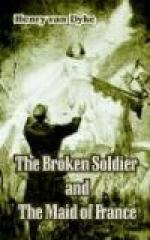“I know, I know,” sobbed Pierre, burying his face in the weeds. “Yet I did it partly for her, and I could not do otherwise.”
“Very little for her and a hundred times for yourself,” said the priest, indignantly. “Be honest. If there was a little bit of love for her, it was the kind of love she did not want. She would spit upon it. If you are going to Switzerland now you are leaving her forever. You can never go back to Josephine again. You are a deserter. She would cast you out, coward!”
The broken soldier lay very still, almost as if he were dead. Then he rose slowly to his feet, with a pale, set face. He put his hand behind his back and drew out a revolver. “It is true,” he said, slowly, “I am a coward. But not altogether such a coward as you think, Father. It is not merely death that I fear. I could face that, I think. Here, take this pistol and shoot me now! No one will know. You can say that you shot a deserter, or that I attacked you. Shoot me now, Father, and let me out of this trouble.”
Father Courcy looked at him with amazement. Then he took the pistol, uncocked it cautiously, and dropped it behind him. He turned to Pierre and regarded him curiously. “Go on with your confession, Pierre. Tell me about this strange kind of cowardice which can face death.”
The soldier dropped on his knees again, and went on, in a low, shaken voice: “It is this, Father. By my broken soul, this is the very root of it. I am afraid of fear.”
The priest thought for an instant. “But that is not reasonable, Pierre. It is nonsense. Fear cannot hurt you. If you fight it you can conquer it. At least you can disregard it, march through it, as if it were not there.”
“Not this fear,” argued the soldier, with a peasant’s obstinacy. “This is something very big and dreadful. It has no shape, but a dead-white face and red, blazing eyes full of hate and scorn. I have seen it in the dark. It is stronger than I am. Since something is broken inside of me, I know I can never conquer it. No, it would wrap its shapeless arms around me and stab me to the heart with its fiery eyes. I should turn and run in the middle of the battle. I should trample on my wounded comrades. I should be shot in the back and die in disgrace. O my God! my God! who can save me from this? It is horrible. I cannot bear it.”
The priest laid his hand gently on Pierre’s quivering shoulder. “Courage, my son!”
“I have none.”
“Then say to yourself that fear is nothing.”
“It would be a lie. This fear is real.”
“Then cease to tremble at it; kill it.”
“Impossible. I am afraid of fear.”
“Then carry it as your burden, your cross. Take it back to Verdun with you.”
“I dare not. It would poison the others. It would bring me dishonor.”
“Pray to God for help.”
“He will not answer me. I am a wicked man. Father, I have made my confession. Will you give me a penance and absolve me?”




